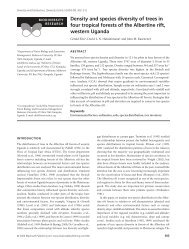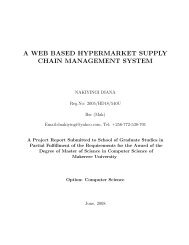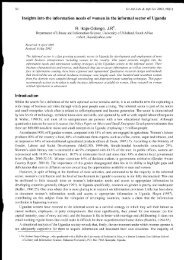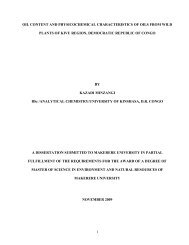THE UNIVERSITY OF LEIPZIG
THE UNIVERSITY OF LEIPZIG
THE UNIVERSITY OF LEIPZIG
Create successful ePaper yourself
Turn your PDF publications into a flip-book with our unique Google optimized e-Paper software.
2 Theoretical Considerations<br />
2.1 Institutions and institutionalism<br />
Institutions and institutionalism are central to contemporary debates across the social<br />
sciences. So too are concepts such as actors, action and agency. In order to understand how<br />
local perceptions shape peoples’ thinking regarding their local environment, or more precisely<br />
local understanding of biodiversity, entails the use of institutional theory in unraveling this<br />
interplay. There is widespread agreement that understanding institutional interplay constitutes<br />
a key challenge for institutionalists and action theories of all types.<br />
This chapter is intended to guide our study through the key debates and contemporary<br />
interpretations regarding the relationship between institutions, resource actors, and the role of<br />
institutions and institutionalism in addressing the governance of resource users, especially in<br />
instances where resources are held in common. The first section of the chapter will compare<br />
the major contending schools of thought in the realm of “new” institutionalism which has<br />
emerged in recent years. Specifically, we shall deal with the rational choice institutionalism,<br />
sociological institutionalism as well as historical institutionalism. In this evaluation we shall<br />
look at their methodological orientations and empirical weaknesses.<br />
The second part of the section shifts the focus from institutions to actors in resource regimes<br />
to find out which branches of institutionalism will be of utmost importance in helping us to<br />
understand the existing perceptions and perspectives in the realm of notion construction in<br />
Kakamega district. The aim here is to explore the theoretical basis for understanding reflexive<br />
practices, of varied actors in society (including individuals, organizations, or groups) in the<br />
use of a natural resource common like Kakamega forest. The analysis will aid our<br />
appreciation of the historical and sociological foundations of their habits, routines, and<br />
strategies in the light of the social and biological interaction.<br />
2.2 Institutions defined<br />
Institutions are simply rules, and as such make the foundation of politics, organization and<br />
ultimately society. Institutions can be divided into formal and informal. Formal institutions<br />
take the form of the national constitutions, statutes, laws, policies, regulations, zoning<br />
ordinances, and permit decisions. Informal institutions are those relating to the cultural,<br />
traditional and other societal norms. 108 Institutions form the basis of contemporary world<br />
order and without them; there would be no organization at all. This study will look at<br />
institutions as mediators of people-environmental relations, hence seeing institutions as<br />
regularized patterns of behaviour between individuals and groups in society, rather than as<br />
community level organizations. 109<br />
108<br />
Norgard, R. B. 1981. Social Systems and Ecosystem Evolution in the Amazon, Journal of Environmental<br />
Economics and Management 3: 238-254.<br />
109<br />
Ostrom, V, D. Feeny and H. Picht. eds. 1988. Rethinking Institutional Analysis and Development: Issues ,<br />
Alternatives and Choice.Sani Francisco, C.A: The Institute for contemporary Studies.<br />
31






